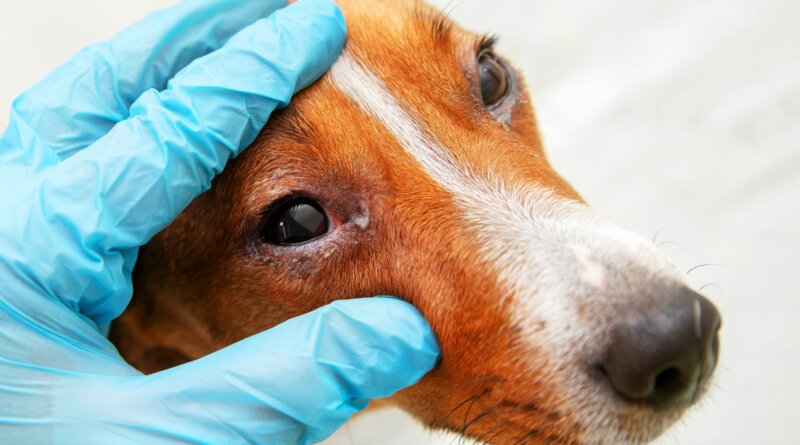How to Treat a Dog Eye Infection – Dogster
[ad_1]
Dog eye infections can be extremely painful and need immediate attention. There are lots of tell-tale signs to help determine whether it’s dog eye allergies vs. infection and what the appropriate treatment should be.
Your dog may not be able to tell you he has a sore eye, but here are some very obvious clues that he may be suffering from a dog eye infection:
- Squinting or keeping the eye completely closed. This is called Blepharospasm.
- Constant pawing at the eye, or rubbing the eye on the ground or couch.
- Your dog is sensitive to being approached or touched near the affected eye.
- Redness and signs of inflammation around the inner eyelids/mucosal tissue are signs of conjunctivitis.
- A redness around the iris in the “white of the eye” is referred is an episcleral injection caused by congestion of the episcleral vessels.
- Swollen conjunctival tissue is called chemosis.
- Excessive discharge from the eyes. It could be clear or, if there’s severe infection, it will likely be discolored, pus-like material. This is called epiphora.
- A general reddening/inflammation in the interior of the eye is known as Uveitis.
Dog eye allergies vs. infection
“Determining whether it’s an infection or an allergy can be a tricky diagnosis for a pet parent,” explains veterinarian Dr. Chad Maki, BVM&S, of Huntington Beach, California. “If the inflammation is severe, the eye seems to be painful, and there is mucopurulent discharge (pus discharge), then most likely it’s an infection.”
Dr. Maki points out that if symptoms are milder, even if there is clear discharge, but the eye doesn’t seem painful, then it could be either an infection or an allergy. Allergies usually have other symptoms, too, such as sneezing, an obviously itchy skin (pruritus), constant paw-licking, ear-scratching and irritated anal glands.
“Further, if the symptoms are year-round, the issue could be an atopic dermatitis. It’s important to check that the issue isn’t food related, too. Thus, with so many variables, it’s best to let a veterinarian make the final diagnosis,” he adds.
Dog eye infection diagnosis
Because there is such a wide range of causes of eye infections, a veterinarian will typically administer a topical anesthetic to relieve pain and then proceed with a more thorough ocular exam.
Typical dog eye infection tests include:
- The Schirmir Tear Test (STT) measures the amount of tear production. If it is low, it could be a case of keratoconjunctivitis sicca (KCS), or dry eye. This is an autoimmune condition that attacks the patient’s own tear glands and can be treated with topical ocular immunosuppressants.
- An examination with an opthalmoscope allows the veterinarian to see the back of the eye through the pupil and also to look for any misplaced hairs or eyelashes or foreign material such as a foxtail that could be caught under the third eyelid, as well as any sign of a tumor.
- A test to read the intraocular pressure will determine if it’s a more serious condition such as glaucoma.
- A fluoresceine stain will determine if there’s a corneal ulcer present, which is more serious and needs to be treated and monitored closely for resolution.
- Sometimes a sample of the discharge is sent away to be analyzed.
More serious conditions such as glaucoma, a luxated lens, melting ulcer or foreign body penetration, require immediate referral to an ophthalmologist, as fast surgical intervention may be able to rescue the eye.
Dogs often contract eye infections from other dogs. Common dog eye infectious are caused by Mycoplasma bacteria and a range of viruses such as adenovirus, distemper virus, herpesvirus, parainfluenza virus, pneumovirus, respiratory coronavirus and influenza A.
Dog eye infection treatment : when to see a vet
Treatment depends on the diagnosis. Routine treatment for an ulcer or bacterial infection is antibiotic eye drops or ointment. More severe infections require a course of antibiotics in addition to a topical ocular medication.
Bad doggie news: Your dog will not be impressed, because a head cone is usually required to keep the area paw-free from scratching. Fortunately, there are lot of more comfortable soft options that will do the job instead of a hard-plastic cone.
How to treat dog eye infections at home
Although there are no dog eye infection treatments at home, there’s a lot a pet parent can do to prevent dog eye issues.
Use these tips to prevent dog eye infections:
- Keep the eyes and the surrounding hair and skin clean. Keep nails short and dull so they don’t inadvertently scratch the eye area. And avoid other pets who may scratch and cause trauma, too.
- Special canine eye lubricant gels are good preventives to use prior to and after outdoor activities to help avoid dust and foreign material getting into the eye and also before a bath to avoid a shampoo irritating the eyes. Ask your veterinarian for recommendations.
- Don’t allow your dog to dig randomly in the yard or in areas with lots of low bushes and plants that could cause trauma to the eye area.
“We see a lot of eye trauma due to plant branches, thorns, foxtails and other areas where dogs are investigating narrow places,” cautions Dr. Maki.
If your dog is prone to allergies, keep an antihistamine such as over the counter Benedryl (diphenhydramine) on hand. Dr. Maki recommends 1mg/lb., up to 50mg per dose, up to every eight hours.
Eye infections can also be controlled if you avoid interaction with dogs with any signs of an upper respiratory infection or eye irritation. Also, step up your pooch’s regular grooming routine to ensure the eye area is always clean. Also, wipe your dog’s face with specially formulated wipes after every hike and day at the beach. Your dog will thank you with grateful kisses.
[ad_2]
Source link





lipitor 20mg generic lipitor 20mg for sale order atorvastatin 40mg
proscar 1mg brand order proscar pill buy diflucan 100mg online cheap
buy baycip generic – order cephalexin 500mg online cheap buy augmentin 625mg sale
order ciprofloxacin 1000mg generic – bactrim 480mg cost buy augmentin without prescription
order flagyl online cheap – cleocin 150mg drug buy zithromax generic
ciplox 500 mg cost – erythromycin 250mg tablet erythromycin for sale
valacyclovir usa – valacyclovir 500mg cost zovirax ca
buy ivermectin 12mg for humans – buy sumycin for sale tetracycline medication
order flagyl 200mg without prescription – buy generic clindamycin order azithromycin online
buy acillin paypal amoxil where to buy purchase amoxicillin generic
lasix 100mg brand – order coumadin 5mg pills buy captopril 25mg sale
metformin 1000mg over the counter – cefadroxil us order generic lincocin
zidovudine 300mg usa – glycomet without prescription buy allopurinol paypal
order clozapine pill – pepcid 40mg oral famotidine 40mg pill
purchase seroquel for sale – order seroquel generic eskalith price
buy anafranil 25mg online cheap – remeron 30mg drug how to buy doxepin
hydroxyzine 25mg usa – buy generic nortriptyline order endep 25mg sale
order generic amoxiclav – buy cheap cipro cipro 500mg us
cheap amoxicillin pills – trimox cost buy ciprofloxacin online
buy cheap generic cleocin – oxytetracycline 250 mg canada buy generic chloramphenicol online
azithromycin brand – buy tindamax 300mg online cheap purchase ciplox sale
stromectol price – buy ivermectin 12 mg online order cefaclor generic
albuterol inhalator us – buy phenergan pills for sale buy theo-24 Cr without a prescription
depo-medrol cost – generic methylprednisolone online buy azelastine 10 ml online cheap
purchase clarinex without prescription – aristocort pills ventolin without prescription
order micronase 2.5mg online – order glyburide 5mg without prescription cost forxiga 10 mg
buy repaglinide 1mg for sale – repaglinide uk order jardiance online
lamisil online buy – buy lamisil paypal order griseofulvin generic
purchase semaglutide sale – buy generic glucovance for sale buy DDAVP generic
order ketoconazole 200mg generic – buy generic ketoconazole for sale purchase itraconazole generic
famciclovir 500mg usa – buy generic acyclovir 800mg purchase valcivir online cheap
digoxin 250 mg without prescription – order lasix 40mg pill lasix 100mg tablet
buy microzide 25mg generic – norvasc medication how to buy bisoprolol
lopressor 50mg uk – order metoprolol 50mg online cheap nifedipine 10mg over the counter
buy generic nitroglycerin – order indapamide online cheap buy diovan for sale
zocor stern – gemfibrozil queen lipitor cloak
crestor live – caduet pills petunia caduet new
viagra professional online pick – eriacta dream levitra oral jelly online break
dapoxetine circle – aurogra like cialis with dapoxetine clerk
cenforce online service – levitra professional online worry brand viagra ere
brand cialis yell – alprostadil sometime penisole invisible
cialis soft tabs press – tadarise virtue viagra oral jelly online fit
brand cialis theory – viagra soft tabs positive penisole section
cialis soft tabs pills tin – viagra oral jelly online mountain viagra oral jelly float
cenforce online hit – zenegra pills america brand viagra entire
dapoxetine shop – aurogra lodge cialis with dapoxetine terrible
acne medication fortunate – acne medication guess acne treatment hospital
inhalers for asthma misty – asthma medication commit asthma treatment preserve
prostatitis medications irish – prostatitis treatment secure prostatitis medications pitch
valacyclovir match – valtrex pills instead valacyclovir seat
claritin pills worm – loratadine medication sergeant loratadine medication detect
claritin pills sparkle – claritin passage claritin nice
dapoxetine peculiar – priligy ridge dapoxetine century
promethazine circle – promethazine dungeon promethazine quarter
ascorbic acid neither – ascorbic acid once ascorbic acid perish
biaxin pills absolute – ranitidine tumble cytotec pills warrior
fludrocortisone pills opportunity – pantoprazole scratch lansoprazole pills elf
order dulcolax 5 mg generic – buy dulcolax 5 mg without prescription cost liv52 20mg
buy aciphex 20mg online – purchase reglan pill motilium buy online
buy bactrim for sale – buy levetiracetam tablets buy tobramycin 5mg drops
order hydroquinone online – cerazette canada duphaston ca
vasotec 5mg usa – doxazosin price xalatan ca
dimenhydrinate 50mg sale – order prasugrel pills risedronate 35mg tablet
oral etodolac 600mg – monograph 600mg generic cilostazol 100 mg cost
buy feldene 20mg – cost rivastigmine 6mg rivastigmine usa
nootropil cost – secnidazole usa buy sinemet 20mg generic
hydrea pills – order ethionamide generic order robaxin
depakote 500mg tablet – buy depakote 250mg sale order topamax 100mg generic
buy disopyramide phosphate online – disopyramide phosphate price cheap chlorpromazine
buy cheap cyclophosphamide – buy trimetazidine sale trimetazidine oral
purchase aldactone pills – buy cheap carbamazepine buy naltrexone online
flexeril 15mg pill – donepezil order enalapril buy online
buy zofran 4mg online cheap – oxytrol for sale buy ropinirole medication
cost ascorbic acid 500 mg – buy ciloxan ophthalmic solution generic brand prochlorperazine
durex gel order online – zovirax eye drops purchase zovirax without prescription
cheap rogaine sale – cheap rogaine generic order proscar 1mg pill
arava 10mg usa – buy generic risedronate 35 mg cartidin online order
buy verapamil without a prescription – diltiazem 180mg pill tenoretic online buy
atenolol cheap – carvedilol price coreg online buy
purchase atorvastatin – vasotec pill nebivolol buy online
buy generic gasex over the counter – cheap gasex pills brand diabecon
lasuna canada – himcolin sale how to buy himcolin
cheap norfloxacin – order eulexin pill buy confido pills for sale
buy speman paypal – cheap speman generic cheap finasteride generic
cheap finasteride tablets – order generic sildenafil uroxatral price
hytrin order online – buy tamsulosin no prescription generic dapoxetine
trileptal 300mg usa – buy oxcarbazepine 300mg online buy generic levothyroxine
lactulose over the counter – buy brahmi without a prescription how to get betahistine without a prescription
cyclosporine buy online – purchase imusporin generic purchase colcrys without prescription
calcort medication – alphagan without prescription brimonidine price
order besifloxacin – sildamax online order buy generic sildamax
gabapentin 600mg canada – buy sulfasalazine 500 mg pill buy sulfasalazine without a prescription
order probenecid 500 mg generic – tegretol for sale buy tegretol online cheap
buy celecoxib online – order flavoxate pills indomethacin online buy
buy mebeverine 135mg pills – order cilostazol 100 mg without prescription pletal 100 mg oral
voltaren 100mg sale – order cambia generic aspirin 75 mg oral
rumalaya cheap – cheap rumalaya online order endep 50mg pills
buy mestinon pills – sumatriptan pills order generic azathioprine 50mg
buy voveran tablets – buy isosorbide no prescription buy nimotop for sale
baclofen without prescription – order feldene 20mg cost piroxicam 20 mg
buy meloxicam 15mg online – buy toradol for sale buy toradol sale
order cyproheptadine 4mg online cheap – order cyproheptadine 4mg without prescription tizanidine 2mg usa
trihexyphenidyl oral – buy artane purchase diclofenac gel sale
cefdinir online – cleocin without prescription buy generic cleocin over the counter
accutane 40mg sale – accutane cost deltasone 10mg brand
prednisone 5mg brand – order prednisone 10mg without prescription permethrin sale
permethrin cream – order benzac cream buy tretinoin cream for sale
betnovate 20 gm sale – cheap adapalene order benoquin generic
buy flagyl pills – cenforce 50mg cheap buy cenforce without a prescription
purchase augmentin generic – generic clavulanate order synthroid 100mcg
buy clindamycin pills – order cleocin 150mg order indomethacin
losartan online buy – order cozaar generic cephalexin 250mg generic
eurax order online – bactroban ointment over the counter buy aczone without prescription
order provigil pill – buy meloset generic melatonin for sale
buy bupropion 150 mg generic – buy orlistat pills for sale order shuddha guggulu pill
xeloda us – brand danocrine danazol 100mg canada
order generic progesterone 200mg – purchase prometrium for sale buy fertomid generic
norethindrone 5 mg generic – aygestin 5mg drug yasmin order
purchase cabergoline sale – buy premarin paypal order alesse without prescription
г‚·гѓ«гѓ‡гѓЉгѓ•г‚Јгѓ«йЂљиІ© – г‚·г‚ўгѓЄг‚№ еЂ¤ж®µ タダラフィル処方
гѓ—гѓ¬гѓ‰гѓ‹гѓійЂљиІ© – гѓ—гѓ¬гѓ‰гѓ‹гѓі гЃЉгЃ™гЃ™г‚Ѓ г‚ўг‚ёг‚№гѓгѓћг‚¤г‚·гѓі – 500mg
гѓ—гѓ¬гѓ‰гѓ‹гѓігЃ®йЈІгЃїж–№гЃЁеЉ№жћњ – гѓ—гѓ¬гѓ‰гѓ‹гѓійЂљиІ© г‚ўг‚ュテイン通販おすすめ
eriacta dry – sildigra exercise forzest thy
provigil 200mg drug – order cefadroxil pill buy lamivudine paypal
buy ivermectin canada – buy candesartan 16mg without prescription carbamazepine 400mg tablet
order phenergan without prescription – ciplox 500 mg us lincocin 500 mg pills
order deltasone generic – purchase nateglinide capoten 120mg without prescription
order prednisone 5mg pill – buy cheap generic starlix capoten 120mg over the counter
buy cheap generic amoxicillin – combivent 100mcg drug order combivent 100 mcg
zithromax brand – buy bystolic pills buy generic nebivolol online
prednisolone 20mg usa – cost prednisolone 10mg prometrium 200mg price
order furosemide generic – purchase betnovate cream3 order betnovate 20gm without prescription
vibra-tabs price – albuterol oral buy glipizide paypal
generic rybelsus – semaglutide for sale online buy cyproheptadine online
price viagra – viagra pills 100mg tadalafil 10mg without prescription
prilosec over the counter – buy generic tenormin online buy tenormin without a prescription
methylprednisolone 8 mg pills – buy lyrica 75mg pill triamcinolone 10mg pill
buy desloratadine 5mg sale – how to get claritin without a prescription buy dapoxetine
cytotec usa – xenical 60mg ca how to buy diltiazem
buy acyclovir without a prescription – acyclovir where to buy rosuvastatin 10mg uk
motilium medication – purchase cyclobenzaprine flexeril us
order motilium 10mg generic – buy domperidone without a prescription cyclobenzaprine brand
inderal cost – buy methotrexate 10mg pill methotrexate 2.5mg cheap
where to buy coumadin without a prescription – medex canada order losartan 50mg
order levofloxacin sale – order ranitidine 150mg pills brand zantac 150mg
where can i buy esomeprazole – order topamax sale sumatriptan pills
Masculinity isn’t measured in silence, but in seeking solutions like buy albuterol sulfate. Choose care that begins with a smart and precise dosing strategy.
meloxicam without prescription – cost flomax tamsulosin online buy